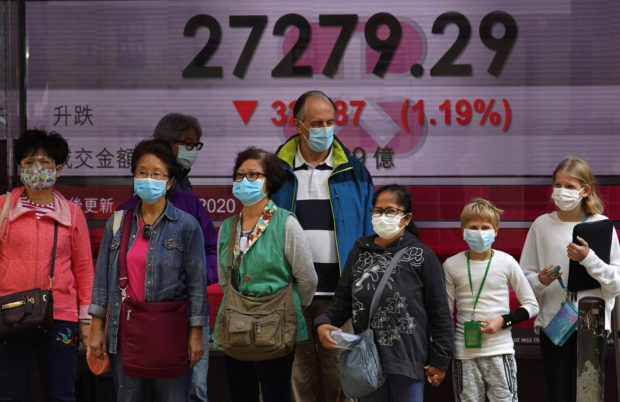Asian stocks follow Wall Street lower on renewed virus fears
BEIJING — Asian stock markets followed Wall Street lower Friday after a spike in new virus cases in South Korea refueled investor anxiety about China’s disease outbreak.

People walk in front of a bank electronic board showing the Hong Kong share index at Hong Kong Stock Exchange Friday, Feb. 21, 2020. Asian stock markets have followed Wall Street lower after a rise in virus cases in South Korea refueled investor anxiety about China’s disease outbreak. (AP Photo/Vincent Yu)
Benchmarks in Tokyo, Shanghai, Hong Kong and Sydney retreated. Traders shifted money into bonds and gold, a traditional safe haven.
Bond markets are “sounding a warning on global growth” as virus fears spread to South Korea, Singapore and other economies, DBS analysts said in a report.
Markets had been gaining on hopes the outbreak that began in central China might be under control following government controls that shut down much of the world’s second-largest economy. Sentiment was buoyed by stronger-than-expected U.S. economic data and rate cuts by China and other Asian central banks to blunt the economic impact.
But investors were jarred by South Korea’s report of 52 new cases of the coronavirus. That renewed concern the infection is spreading in South Korea, Singapore and other Asian economies.
The Shanghai Composite Index lost 0.1% to 3,026.64 and Hong Kong’s Hang Seng tumbled 0.7% to 27,427.36. The S&P-ASX 200 in Sydney lost 0.2% to 7,150.01.
Article continues after this advertisementTokyo’s Nikkei 225 gave up meager early gains, falling 0.1% to 23,456.04. The Kospi in Seoul fell 1.0% to 2,173.37. New Zealand, Taiwan and Southeast Asian markets also retreated.
Article continues after this advertisementOn Wall Street, the benchmark S&P 500 index lost 0.4% on Thursday after being down as much as 1.3% at one point. The Dow Jones Industrial Average fell 0.4%.
Gold touched its highest price since early 2013. The 10-year Treasury’s yield sank to 1.49% from 1.57% late Wednesday.
Yields on 30-year U.S. Treasuries are below 2%, a level last seen in September “when U.S-China trade fears were acute,” said the DBS analysts.
A decline in numbers of newly reported Chinese virus cases suggests “the worst could be over,” they wrote. “However, alternative data suggests that a pickup in activity is still elusive.”
The Korea Centers for Disease Control and Prevention said 41 of the new 52 cases were in the southeastern city of Daegu and the surrounding region.
South Korea’s government declared the area a “special management zone” Friday. The mayor of Daegu urged the city’s 2.5 million people to stay home and wear masks even indoors if possible.
To contain the disease, China’s government starting in late January cut off most access to Wuhan, the central city where the first cases occurred, and extended the Lunar New Year holiday to keep factories and offices closed and workers at home.
Chinese authorities are trying to revive business activity but have told people who can work from home to stay there.
Forecasters say auto manufacturing and other industries won’t recover to normal production levels until at least mid-March.
A rise in new cases reported in Beijing, the capital, “raises alarm” because it suggests major Chinese cities “may be under pressure to contain the virus amidst returning workers” as companies reopen, said Mizuho Bank in a report.
A growing number of companies say they expect to suffer losses due to the virus.
The world’s largest shipping company, Denmark’s A.P. Moller Maersk, said Thursday it expects a weak start to the year.
Air France said the disease could mean a hit of up to 200 million euros ($220 million) for its results from February to April.
Procter & Gamble’s chief financial officer told analysts traffic at stores in China, its second-largest market, is down considerably, though it held firm on its forecast ranges for sales and profit this year.
The worries overshadowed another set of encouraging data on the U.S. economy.
A survey of manufacturers in the mid-Atlantic region jumped to its highest level since February 2017, and a separate report showed leading economic indicators in the United States rose more in January than economists forecast.
The number of workers applying for jobless claims rose but stayed low.
ENERGY: Benchmark U.S. crude lost 33 cents to $53.55 per barrel in electronic trading on the New York Mercantile Exchange.
The contract rose 49 cents on Thursday to settle at $53.78. Brent crude oil, the international standard, lost 21 cents to $59.31 per barrel in London. It rose 19 cents the previous session to $59.31 per barrel.
CURRENCY: The dollar declined to 112.01 yen from Thursday’s 112.09 yen. The euro edged up to $1.0792 from $1.0790.
GSG
For more news about the novel coronavirus click here.
What you need to know about Coronavirus.
For more information on COVID-19, call the DOH Hotline: (02) 86517800 local 1149/1150.
The Inquirer Foundation supports our healthcare frontliners and is still accepting cash donations to be deposited at Banco de Oro (BDO) current account #007960018860 or donate through PayMaya using this link.